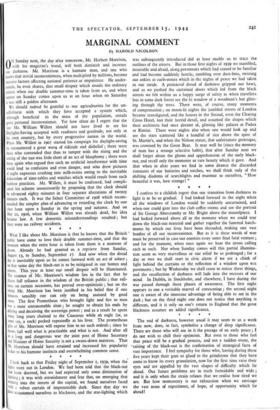MARGINAL COMMENT
HAROLD NICOLSON
ON Sunday next, the day after tomorrow, Mr. Herbert Morrison, with his magician's 'wand, will both diminish and increase our darkness. Mr. Morrison is a humane man, and one who knows that trivial inconveniences, when multiplied by millions, become
massive factors affecting national patience or impatience. He under- stands, he even shares, that small despair which assails the ordinary citizen when our double summer-time is taken from us, and when sunset on Sunday comes upon us at an hour when on Saturday a was still a golden afternoon.
We should indeed be grateful to our agriculturists for the un- selfishness with which they have accepted a system which, although beneficial to the mass of the population, entails grave personal inconvenience. Yet how often do I regret that the late Mr. William Willett should not have lived to see his Daylight-Saving accepted with readiness and gratitude, not only in his own country, but by every progressive nation in the world. When Mr. Willett in 1907 started his campaign for daylight-saving he encountered a great wave of ridicule and disbelief ; there were those who contended that thus to tamper with the rising and the setting of the sun was little short of an act of blasphemy ; there were those again who argued that such an artificial interference with time would lead to confusion and even danger, and who drew pictures of night expresses crashing into milk-trains owing to the inevitable dislocation of time-tables and watches which would result from such heathen practices. Mr. Willett, it must be confessed, had compli- cated his scheme unnecessarily by proposing that the clock should be advanced eighty minutes in four separate alterations of twenty minutes each. It was the Select Committee of 1908 which recom- mended the simpler plan of advancing or retarding the clock by one clear hour upon a Sunday in the spring and autumn. And on May 21, 1916, when William Willett was already dead, his idea became law. A few domestic misunderstandings resulted ; but there were no railway accidents.
* * * *






















 Previous page
Previous page